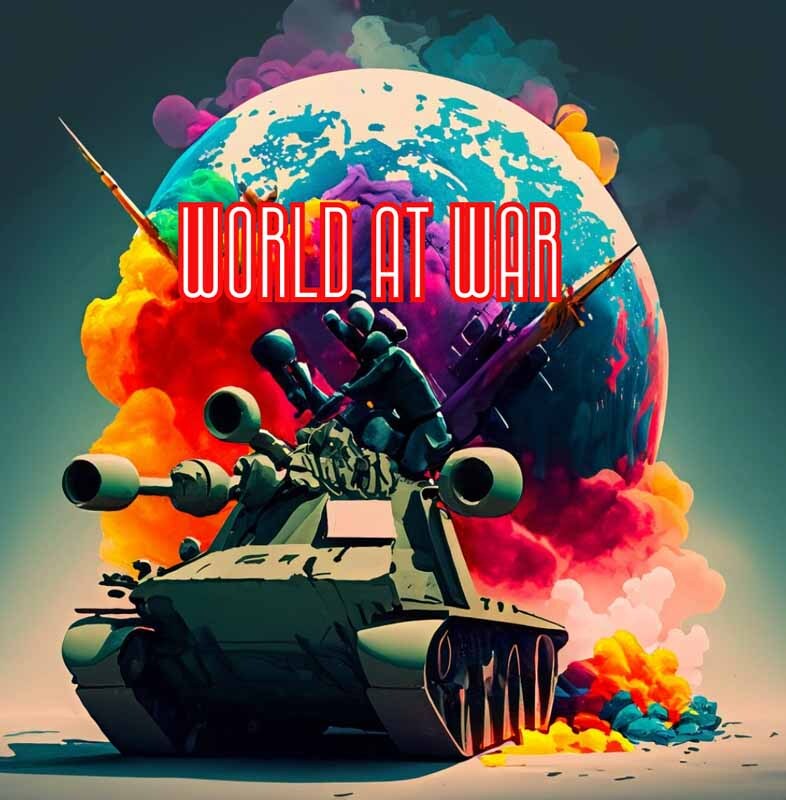Notifications
 News Staff
News Staff![]() -
October 14, 2023 -
Arts & Culture -
World at War
Israel Hamas
Ukraine Russia
-
6.5K views -
0 Comments -
0 Likes -
0 Reviews
-
October 14, 2023 -
Arts & Culture -
World at War
Israel Hamas
Ukraine Russia
-
6.5K views -
0 Comments -
0 Likes -
0 Reviews

DLNews World at War:
Wars and conflicts are a longstanding feature of human societies, contributing to the devastation of human lives and affecting regions' social, political, and economic fabric. Many battles and conflicts occur worldwide, with an estimated 20 significant actions and over 100 lesser conflicts. These conflicts have resulted in millions of people being affected by deaths, injuries, and displacement.
The ongoing conflict between Israel and Hamas is one of the most significant. It poses the potential to become a global crisis if not handled with the utmost care, even with the potential use of nuclear weapons. The consequences of conflicts can be far-reaching and negatively impact progress and development.
The rise of dangerous autocrats worldwide is attributed to political instability, weak institutions, social and economic crises, and flawed electoral processes. These leaders often use illegal means to ascend to power and, once in ability, use propaganda, censorship, and other tactics to suppress opposition and maintain their grip on power. This scenario frequently leads to conflicts with neighboring regions and severe consequences for affected populations.
Despite the significant humanitarian, social, and economic costs of conflicts, the root causes of such challenges remain unclear. The global environment has undergone fundamental changes, and disputes have evolved to involve complex confrontations and conflicts between local groups and regional and international powers.
The full-scale Russian invasion of Ukraine in 2022 has positioned Europe and Central Asia as the epicenter of global political violence, overshadowing the escalation of conflict in most other regions worldwide. This escalation has also deteriorated security in longstanding conflict hotspots such as Afghanistan and Yemen.
The exact count of soldiers and civilians who have lost their lives due to wars and conflicts is unknown. The figures vary depending on different sources and the context of the competition, but it is estimated that millions have lost their lives due to conflicts in recent years. For instance, the Syrian conflict began in 2011 and has claimed more than 500,000 lives, with millions more displaced. Similarly, the war in Afghanistan, which started in 2001, has resulted in tens of thousands of deaths and many more injuries.
2022 marked a significant expansion in remote violence, particularly in shelling and air warfare events, showcasing a transformation in contemporary warfare. This change in tactics can be attributed to a global decrease in armed conflict and an increasing reliance of armed groups on remotely delivered weapons. The use of artillery and missile strikes against civilian areas has increased in countries such as Ukraine, Iraq, Turkey, Mali, and Burkina Faso, leading to devastating consequences.
Civilian communities have emerged as the primary targets of global political violence, with attacks against individuals, property, and infrastructure becoming increasingly prevalent. The average number of civilian fatalities due to political violence rose significantly in 2022 compared to the previous year, with conflict-related activities such as air and ground attacks, shelling, and sniping being the leading cause of these deaths. State forces and armed groups such as rebels and jihadists were the primary actors in these attacks. The conflict in Syria, which began as peaceful protests in 2011, remains the deadliest source of political violence globally.
Other significant sources of death and destruction included the fighting in South Sudan, which has displaced or caused the death of tens of thousands of people since the onset of the civil war in December 2022. Additionally, drug war-related violence has increased in Colombia and Mexico. Lastly, protracted civil wars in countries such as Afghanistan, the Central African Republic, Ethiopia, Libya, Somalia, Sudan, and Syria, as well as several other smaller nations, continue to affect the lives of millions worldwide, causing severe economic, political, and social disruptions for their citizens.

Share this page with your family and friends.